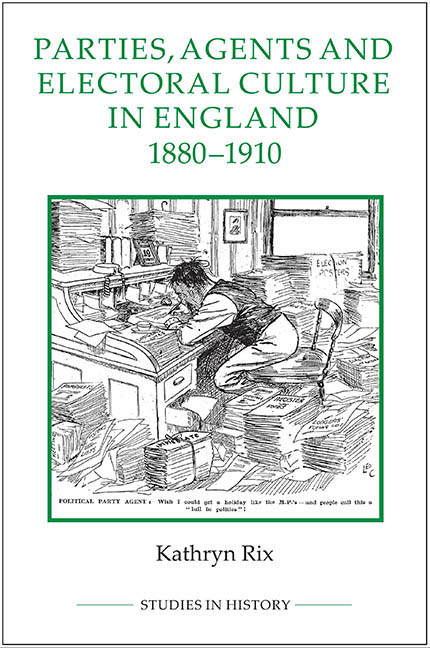Book contents
- Frontmatter
- Dedication
- Contents
- Tables
- Acknowledgements
- Abbreviations
- Introduction
- 1 The changing electoral system
- 2 The rise of the professional agent
- 3 The agents as aspiring professionals
- 4 The agents in the constituencies: registration and political education
- 5 The Agents in the Constituencies: The Social Side of Politics
- 6 Electioneering: the candidates
- 7 Electioneering: the campaign
- Conclusion
- Bibliography
- Index
2 - The rise of the professional agent
Published online by Cambridge University Press: 13 April 2017
- Frontmatter
- Dedication
- Contents
- Tables
- Acknowledgements
- Abbreviations
- Introduction
- 1 The changing electoral system
- 2 The rise of the professional agent
- 3 The agents as aspiring professionals
- 4 The agents in the constituencies: registration and political education
- 5 The Agents in the Constituencies: The Social Side of Politics
- 6 Electioneering: the candidates
- 7 Electioneering: the campaign
- Conclusion
- Bibliography
- Index
Summary
The veteran Conservative MP Sir William Hart Dyke, who first entered the Commons in 1865, reflected in 1903 on the ways in which political agency had changed, remarking to the Conservative agents that ‘of late years, not only the capacity, but the position and character of the party agents had been raised’.The agents’ recently enhanced standing was similarly commended by Schnadhorst in 1890, when he acknowledged that there was ‘a certain amount of justification in the remark that used to be made, namely, that the position of a political agent was one not held in the highest esteem, nor one perhaps that would bear, on all occasions, the closest investigation’.
Historically two key factors had contributed to the agents’ poor status. The first was their association with corrupt practices and excessive election spending. These dated back to the eighteenth century, when ‘complaints against dishonest or inefficient agents filled the correspondence of almost every political man’. The belief that solicitors regarded elections as opportunities for profit persisted into the nineteenth century. Hart Dyke complained to Disraeli in 1873 that those running elections in Kent ‘have only cared for the filthy lucre, & have been content to lose any seat, so long as the victim they brought forward paid the bill’.4The corrupt 1880 election reinforced this dim view of solicitor agents. John Bright wrote that of all the money spent at elections, ‘the expenditure upon lawyers … is the worst, and smells most of corruption’, while Sydney Buxton, Liberal candidate at Boston, characterised the agent as ‘in three cases out of four … a mere money-sucker’.5Although agents were to some extent used as scapegoats for corruption and profligate expenditure in which candidates and voters were also complicit, their reputation was still far from flattering.
In contrast, George Russell in 1906 emphasised the agent's improved reputation in this respect. Whereas the ‘Ancient’ agent was a somewhat dubious character, keen to feather his own nest and conducting ‘mysterious transactions … in quiet corners’, the ‘Modern’ agent was earnest and abstemious: ‘He sleeps with the Corrupt Practices Act by his side.’
- Type
- Chapter
- Information
- Publisher: Boydell & BrewerPrint publication year: 2016

